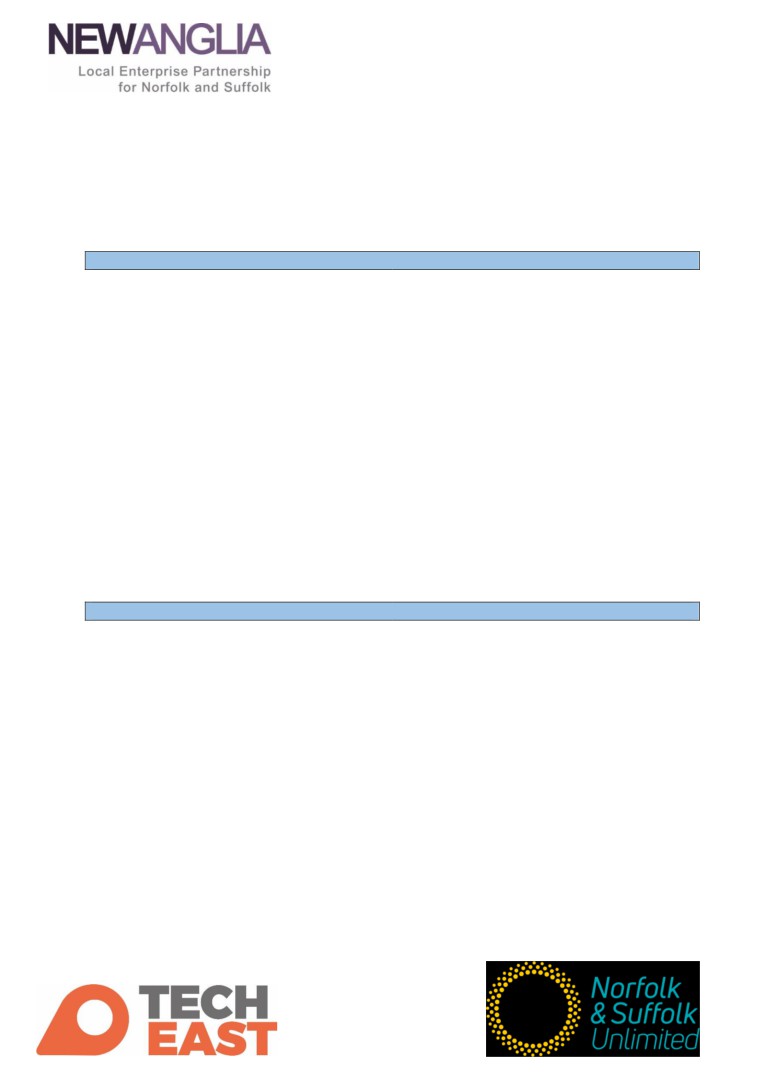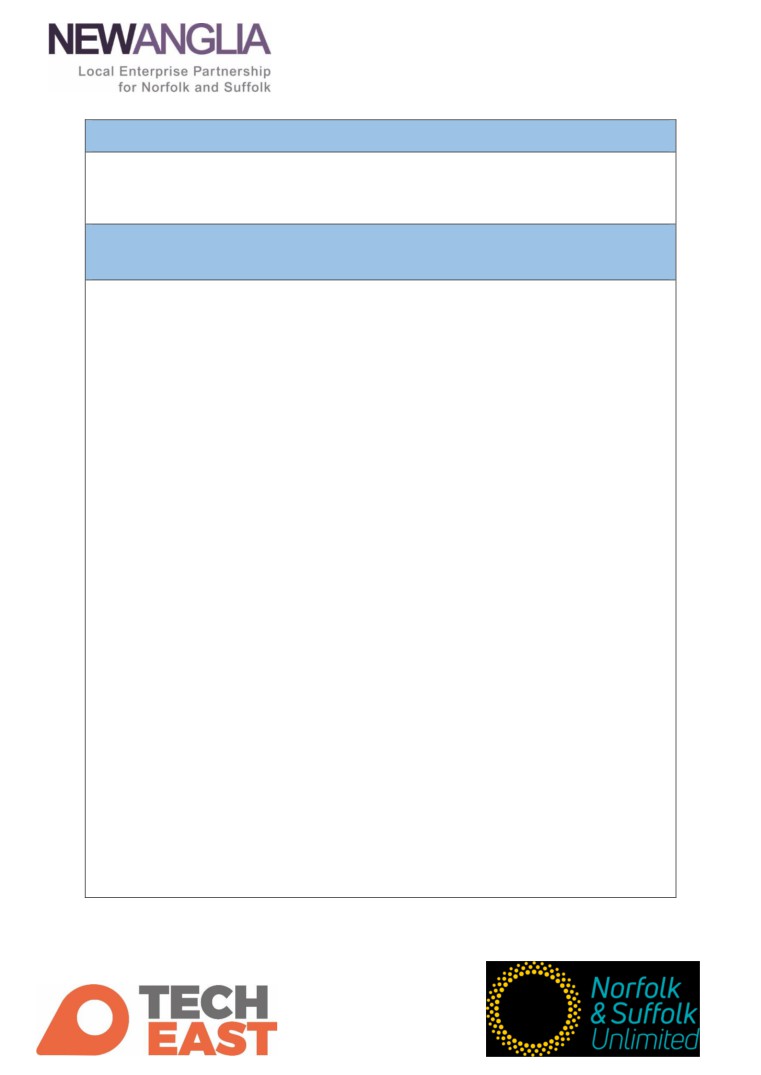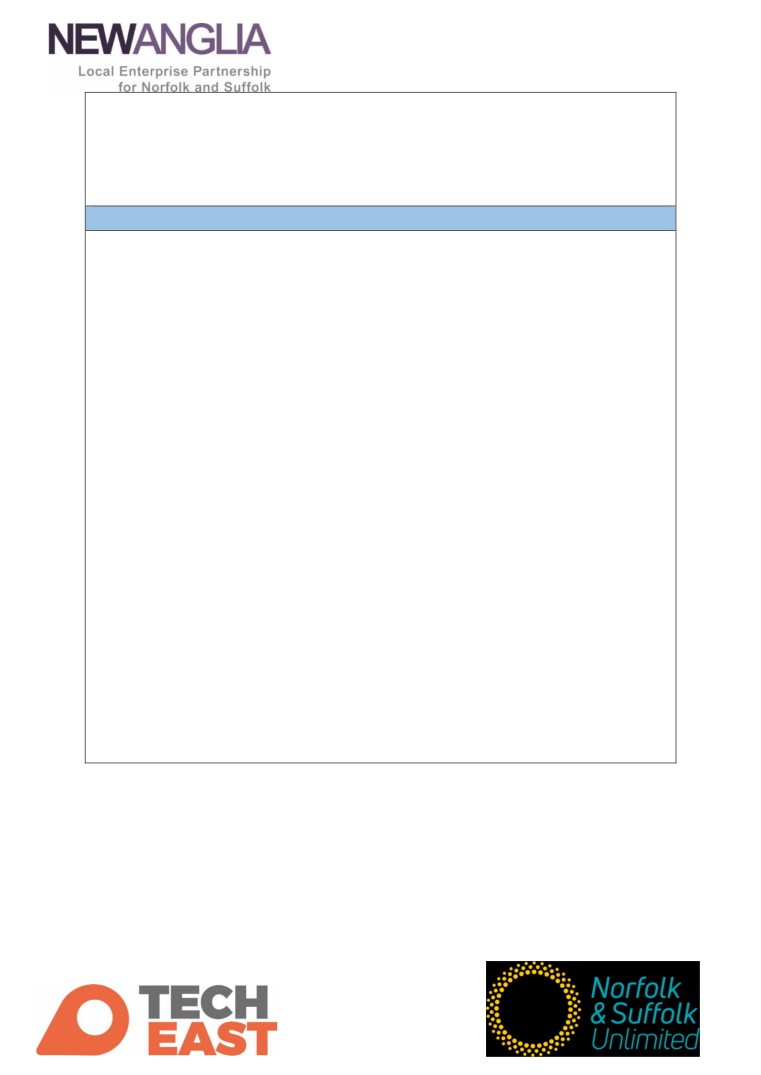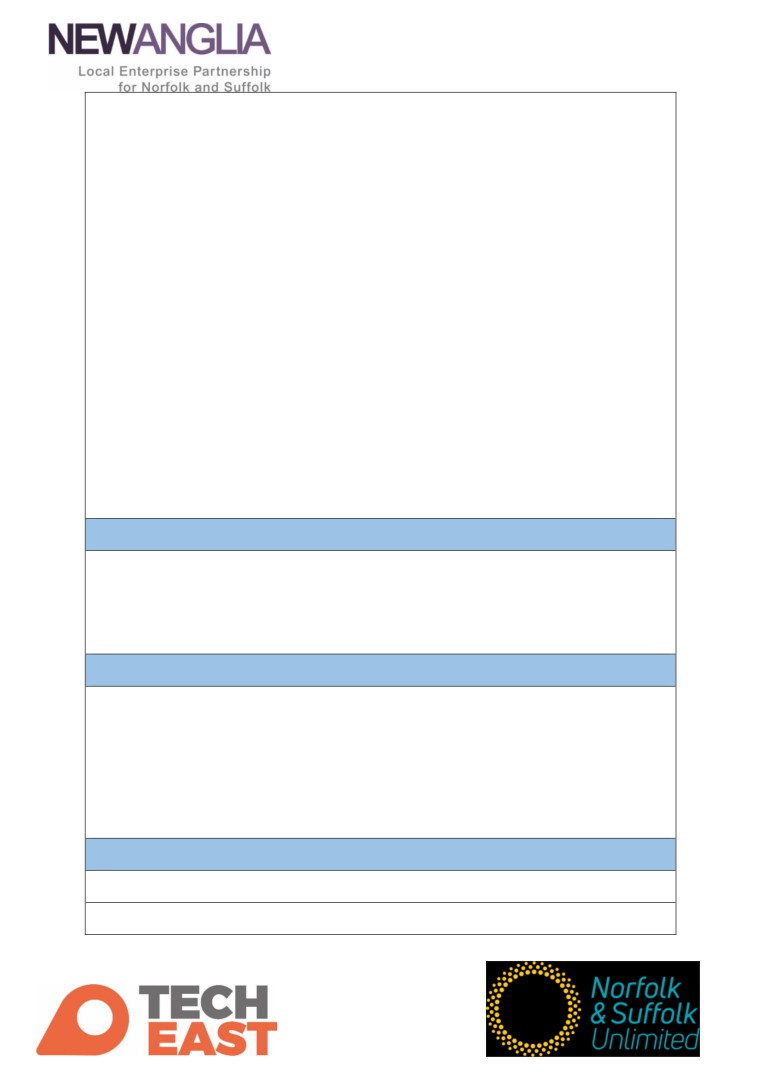Norfolk and Suffolk Council for Digital Tech - minutes
Chair: Neil Miles
Date: Thursday 11 June 2020 Time: 14:00-16:30
Videoconference
PRESENT
Peter Brady, Orbital Media
Maddie Coupe, New Anglia LEP
John Fagan, Axon Vibe
Viv Gillespie, New Anglia Colleges
Anette Gilham and Ipswich Borough Council
Thea Goodluck, Tech Nation
Michelle Gordon, Ipswich Borough Council
Steve Kierney, Epos Now
Graham Masterson, Consultant
Neil Miles, Inawisdom (Chair)
Julian Munson, New Anglia LEP
John Nicholson, IJYI
Lisa Perkins, BT
Jai Raithatha, Suffolk County Council
Catherine Richards, New Anglia Colleges
Tim Robinson, Tech East
Sarah Steed; Norwich University of the Arts
Mark Thomas, Coderus
Stef Thorne, University of Suffolk
Ellen Tilney, Norwich City Council
Brigette Currin, Tech East (taking minutes)
Apologies
Marlon Bowser, HTK
James Duez, Rainbird
John Dugmore, Suffolk Chamber
Dominic Keen, Britbots
Fiona Lettice, UEA
Chris Sargisson, Norfolk Chamber
Chris Starkie, New Anglia LEP
Roberta Willner, Norfolk County Council
Dean Withey, Ubisend
Delivered by:
Welcome and introductions (Chair)
NM welcomed everyone to the meeting, the first since lockdown and thanked everyone for
giving their time to attend the meeting during this period.
State of play:
Digital sector overview March-June (Tim Robinson)
TR gave a short overview of the impact of lockdown on the sector. The tech sector is proving
relatively resilient compared with others. Businesses are mostly operational close to
business as usual with a few having pivoted. If members of the Council hear of any
businesses needing support please refer to Tech East or New Anglia Growth Hub. We are
yet to see the full impact of COVID19 but there will also be opportunities.
The key message is not to generalise about the sector locally. Tech businesses are serving
many different vertical markets. Some of those markets are highly compromised by
COVID19 but others are experiencing a spike in demand (e.g. edtech, healthtech).
The Government and Treasury’s response for the tech sector has been a mostly
comprehensive but also fairly blunt instrument with a willingness to iterate on regular basis.
Tech East continues to lobby to Government on the things that matter for local businesses.
There have been pivots by local tech companies which have gathered traction with national
news e.g. Pathfindr, Rainbird, Engage Health, Safepoint etc. Many businesses have
responded with agility and speed which demonstrates the resilience of the tech ecosystem
within Norfolk and Suffolk.
COVID19 has catalysed much faster adoption of digital tools and products and services
within many organisations in both the private and public sector. There is a decline of old
business models which provides opportunities for some businesses locally.
There are clear needs within all kinds of organisations for enhanced digital skills. The
challenge is to identify exactly what skills and at what level are needed but there is a major
opportunity on the skills agenda to deliver effectively against these needs
There was a worry that planned investment deals would dry up but with combination of
Future Fund, Innovate UK support and notable recent deal flow there is some reassurance
for 2020/21 transactions. The Angel market is challenged as there have been impacts on
individuals’ wealth and Future Fund convertible loans are not EIS/SEIS compatible.
Questions that need focus from the Council are:
• how do we continue to support innovation in tech businesses when it is harder to do
so without face-to-face meetings and the serendipity that co-work spaces enable?
• how do we better connect tech businesses with customers in non-tech sectors?
• how do we continue to tackle the challenge of diversity within the tech sector?
Delivered by:
Discussion
Members of the Council discussed concerns over cash flow, loans and funding for tech
businesses. It is important to gather feedback from businesses and use this to lobby to
Government. MC said that insights should be fed to James Allen at New Anglia LEP who is
gathering information on a weekly basis for Government.
Economic Recovery Plan for Norfolk and Suffolk (Madeleine Coupe)
MC talked through the recovery plan for Norfolk and Suffolk. The LEP has been working to
support businesses through the crises of COVID19 pandemic and the various impacts that
has played on the region’s economy.
The LEP is currently in the process of developing the recovery plan for Norfolk and Suffolk.
Each member of the Council will have received a draft copy of the recovery plan and are
invited to feedback to the LEP by 12 June 2020.
Recovery will be in 3 phases.
Phase 1: Response. Gathering information over the past few months to respond to the
pandemic for example at individual business level, through partners supporting
manufacturing businesses to make PPE, the business support offer through the Growth Hub
and the new business resilience funding scheme recently launched.
Phase 2: Restart. This is the plan that is currently being worked on and which was shared
with members of the Council. The actions set out in the plan will need to be executed over
the next 12 months to help the economy restart. The plan will be published within the next
few weeks. This is a live plan to be updated regularly over the coming year. It will consider
the impact of the pandemic on all the different sectors and develop support packages for
each of those.
The structure of the strategy will be similar to that of the Local Industry Strategy, looking at
the five foundations of productivity within the different sectors:
• Business Environment - including access to PPE, support and advice, funding
• People - redundancies, training, digital skills, impact on FE/HE, inclusive growth
• Ideas - support for businesses to innovate, developing new market opportunities.
• Infrastructure - major projects, public transport, housing, utilities, digital connectivity.
• Places - local action plans which focus on locally specific need and action.
Delivered by:
Phase 3: Rebuild. Then the next stage will be to develop a strategic long-term document
with a 3-5 year timeline which will be the growth plan. This will look at the big strategic
interventions that are needed to rebuild the economy looking at the above 5 foundations for
productivity but also bringing in the ambitions from the LIS about how we can ensure more
inclusive and clean sustainable growth within the economy.
Discussion
The Council discussed things to be considered which included challenges and opportunities
for the tech sector, and what the recovery plan should include. Members were asked to
feedback further comments on the Economic Recovery Plan to TR who would consolidate
comments into a single response for the LEP. Finally, as a group the Council should start to
think about the longer-term strategic plans needed for rebuilding the economy and the role of
an aligned tech sector in achieving this.
Deep dive: Adastral Park, Martlesham (Lisa Perkins)
LP gave an overview of Adastral Park’s operational functions prior to COVID19. Adastral
Park has been the global R&D centre for BT for 50 years. More recently there have been
ambitions to grow a tech cluster under the brand of Innovation Martlesham. This has grown
to over 140 businesses not all of which are physically based at Adastral Park but contribute
to the cluster and benefit from the advantages that are on offer. The ambition was to have
more companies physically housed at Adastral Park but post COVID19 there is a need to
look at what will benefit the tech cluster as the new ‘normal’.
Adastral Park as a cluster generates approximately £1BN GVA per annum and is growing,
and therefore has a significant impact for the region. Continuously looking to grow the
ecosystem and find the best innovative solutions that will either be able downstream into
BT’s lines of business or out from BT to create opportunities for the region in terms of
business growth, jobs, the talent pool and creating an outstanding ‘home’ for the next
generation of technologists.
Adastral Park has been recognised by the government for the work it has achieved by being
identified as a High Potential Opportunity (HPO) for 5G and Digitalisation.
Adastral Park has a large number of specialist facilities that help differentiate it from other
locations. How can we leverage that from a regional perspective even more effectively to
create opportunities for attracting and growing businesses and developing the East region?
More companies want to be part of the cluster. How as a Council can we help influence the
investments that are needed to expand and upgrade the physical location?
Discussion
The Council discussed the importance of having a physical place for businesses to connect
with each other, often through chance meeting where business opportunities naturally
unfold. Together the Council and Tech East can gather information of what tech businesses
need to help influence the delivery of support programmes to Innovation Martlesham
businesses and appetite for a hybrid model for businesses where staff mainly work from
home but have a place where they can continue to meet. We will need to understand what it
is businesses need and expect from a physical space. The Council agreed to support
Adastral Park’s ambition to grow and thus drive the development for the region.
Delivered by:
Workstream updates (Tim Robinson on behalf of Task & Finish Groups)
The four Task and Finish Groups have met and made progress since the last full Council
meeting in February. TR gave the following update:
Innovation Hubs: (JM, MC and TR)
A proposition is being developed in line with the Local Industrial Strategy for Norfolk and
Suffolk to introduce a new joined-up offer and programme of activity that will stimulate
collaboration and innovation which includes connecting up innovation centres and assets
opening up access which encourages cross sector collaboration. The aim is to have linked
physical locations supporting a cluster of innovative businesses, not just separate managed
co-working spaces. The group has identified the current innovation hubs, from well
developed hubs such Innovation Martlesham, NRP and CEFAS to the newest hubs in
Stowmarket, as well as conference centres or non-core hubs throughout the region and
looked at national hubs as exemplars.
The next steps are to fully map the individual capabilities of each hub and work up a detailed
proposition adding value to and leveraging the business support offered by individual hubs.
Discussion: It is important to understanding what each hub offers in terms of support and
what their ‘member’ businesses offer in terms of products and services. Once this is
understood and their needs are identified it will be easier to support, connect and promote
the regional hubs. Engagement with businesses outside the clusters also needs to be
considered.
Talent & Skills: (Skills Task Force)
COVID19 has affected the skills provider sector in ways that requires a different approach.
The Task Force has identified virtual work experience is an opportunity, there is a significant
problem with young people around the counties not being able to access IT equipment and
discussion is on going regarding linking the major capital investment projects (BT/University
of Suffolk, City College Norwich, Suffolk New College and Productivity East) with a
communications narrative. There is also a live opportunity with Institutes of Technology.
Recommended next steps:
• Engaging schools and businesses for virtual work experience opportunity. SCC are
leading on this
• Signpost the Department for Education equipment provision scheme
• Updating the Sector Skills Plan to refocus on tech skills for non-tech employers
Access to Programmes & Finance: (FL, TG and TR)
There are many support programmes and schemes available through a variety of sources
e.g., banks, accelerators, Tech Nation, Universities, LEPs etc. The aim is to understand
how these programmes are driven by what startups/scaleups want/need and identify any
gaps and opportunities for better signposting. There is value in key account management
and brokerage, matchmaking these companies at scale across the region with relevant
programmes.
Delivered by:
Recommended next steps:
• Invite Richard Glinn, Manager at the New Anglia Growth Hub to do a deep dive
• Speak to founders and executives who have participated these programmes to
understand their experience
• Engage with companies who do not participate in such programmes to understand
their needs and motivations.
Communicating our region’s ecosystem: (PB, CS and TR)
Linked to the above groups, how better can we communicate what is happening within the
region leading to improved outcomes. We need to show the value of what the tech sector
offers in the region, rather than just ‘telling’. The Council has the ability to shape and
influence the communications which can be linked to the Norfolk & Suffolk Unlimited brand
and Inward Investment activity
Recommended next steps:
•
Invite David Dukes, Inward Investment lead to undertake a deep dive
•
Build on existing platforms e.g. Sync the City, HPO, AI Festival, Tech East 100 etc
•
A specific outcome is to build relationships with national journalists (e.g. Sifted,
Techcrunch, broadsheets) to understand that businesses in the region are already
doing well and there is a pipeline which will continue to build pace
Minutes and Matters Arising
Minutes
The previous minutes were agreed.
Matters arising
All actions from the previous meeting had been completed.
Any Other Business
MT: What will the Council do to help manage the impact of Brexit when the transition period
ends? How does this link to the growth agenda for the region?
MG: Responded by saying that Brexit and COVID19 are being dealt with together in the LEP
recovery work.
JM: The Council will need to discuss this in more detail and the next meeting.
MG: Is moving from Ipswich Borough Council to Babergh & Mid Suffolk Council. Annete
Gilham will take over on DTC.
Date of next meeting
15 September 2020, format TBC
Meeting closed
Delivered by:





